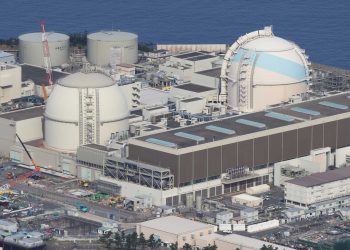Agence France-Presse,
BEIJING (AFP): North Korea has raised hopes of major progress at six-nation talks aimed at ending its nuclear weapons programme, promising a result in the latest round due to begin here Thursday.
“We have agreed not to disappoint you by producing a result out of the six-party talks,” Kim told reporters on Wednesday night after he met for 90 minutes over dinner with his US counterpart, Christopher Hill.
“The concrete details will be disclosed in the process of talks.”
Hill on Thursday morning gave a more cautious forecast for this round of talks, which are due to start at 0800 GMT and wrap on Sunday, but also signalled that significant developments could be on the cards.
“We would like to do more, the DPRK (North Korea) would like to do less. (But) we will figure out a way through that, this is not a big gap,” he told reporters.
He then went into another one-on-one meeting with Kim, and was due to have bilateral talks with the chief envoys of the other nations involved — China, South Korea, Japan and Russia — ahead of the formal start in the afternoon.
The six-nation talks began in 2003 with the aim of convincing North Korea to abandon its nuclear weapons programme, but failed to stop the reclusive regime from conducting its first atomic weapons test in October last year.
Hoever the parties finally agreed in February that North Korea would scrap its nuclear programme in return for a wide range of economic, diplomatic and security concessions.
After North Korea closed its main nuclear reactor in July in return for 50,000 tonnes of fuel oil, this week's session is aimed at seeing the regime declare all of its atomic programmes and set a timeframe for disabling them.
Hill said on Wednesday that he hoped North Korea would disable its nuclear programmes by the end of the year, and described the disarmament process as heading into a “very important stage.”
“If we can be successful by the end of this year in getting this disabling and full declaration, we can then move on to what I hope to be the final phase next year, which is the complete denuclearisation of the Korean peninsula,” he said in Tokyo.
While North Korea has closed its main Yongbyon reactor, no-one outside of the communist country is sure how much fuel for atomic bombs the country has already produced, and what other programmes it has secretly developed.
North Korea would eventually receive one million tonnes of fuel oil in return for completely scrapping its nuclear weapons programme.
One of the major incentives for North Korea is for it be removed from a US list of nations accused of supporting terrorism, but Hill said in Tokyo that no decision on that had been made.
“Obviously, this is something the DPRK very much wants but we've made it very clear it depends on further denuclearisation,” Hill said.









